Case Study Analysis: Leadership and Change in Healthcare
VerifiedAdded on 2022/09/11
|13
|3000
|18
Case Study
AI Summary
This case study analyzes Barbara Norris's role as a nurse manager at Eastern Massachusetts University Hospital's General Surgery Unit (GSU). The analysis examines the unit's low employee satisfaction, hierarchical conflicts, and the impact on patient care. The report explores the problems, methods used by Barbara, and the key factors contributing to employee discontent. It highlights stakeholders affected by the flaws, including nurses, doctors, and patients. The study applies Herzberg's Two-Factor Theory and the Middle Range Theory to recommend strategies for improving job satisfaction, addressing conflicts, and enhancing patient outcomes. The case emphasizes the importance of addressing issues like lack of collaboration, favoritism, and the shift in focus from patient care to administrative priorities. The report also touches upon the impact of funding shortages and the significance of employee involvement in decision-making processes.
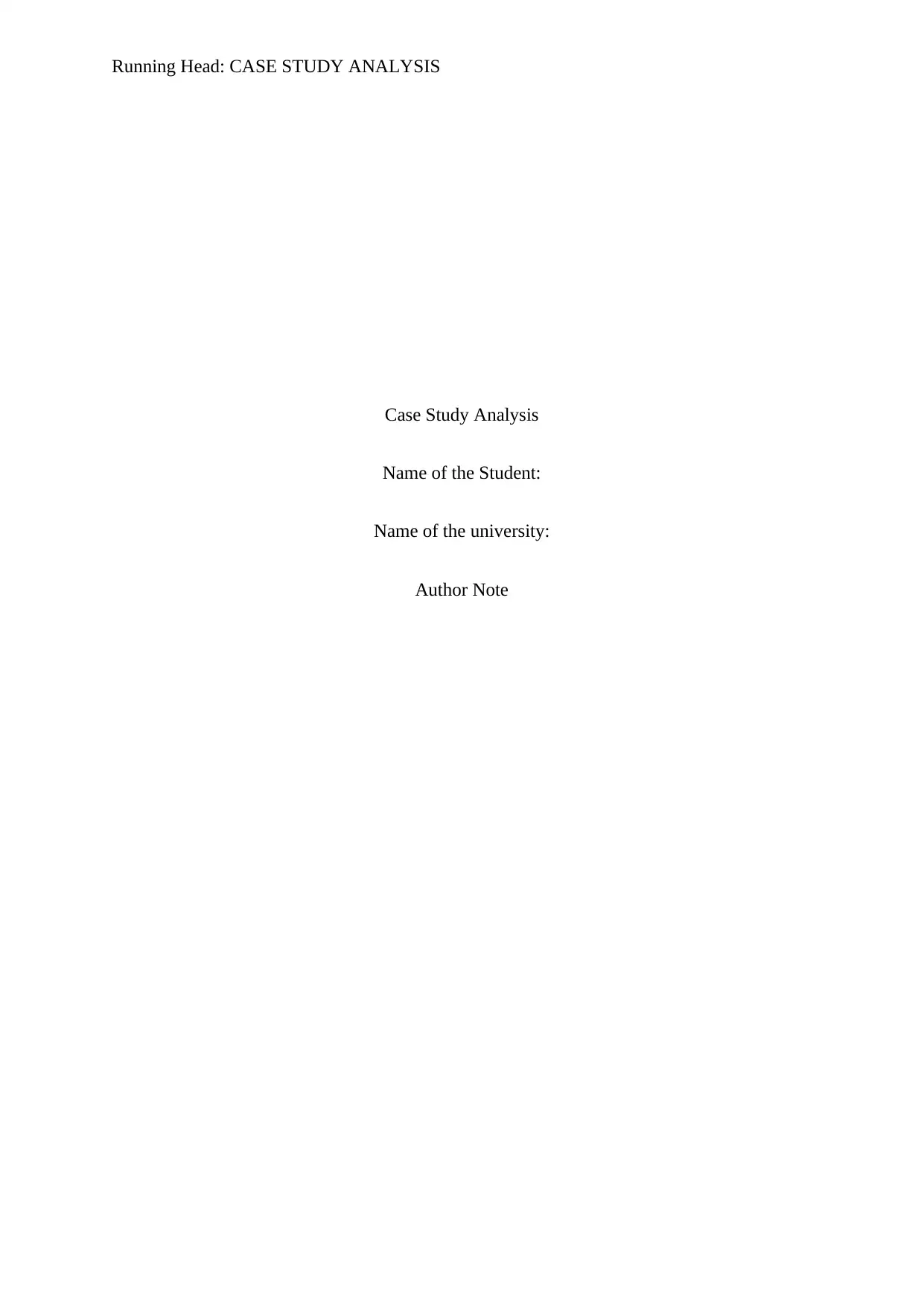
Running Head: CASE STUDY ANALYSIS
Case Study Analysis
Name of the Student:
Name of the university:
Author Note
Case Study Analysis
Name of the Student:
Name of the university:
Author Note
Paraphrase This Document
Need a fresh take? Get an instant paraphrase of this document with our AI Paraphraser
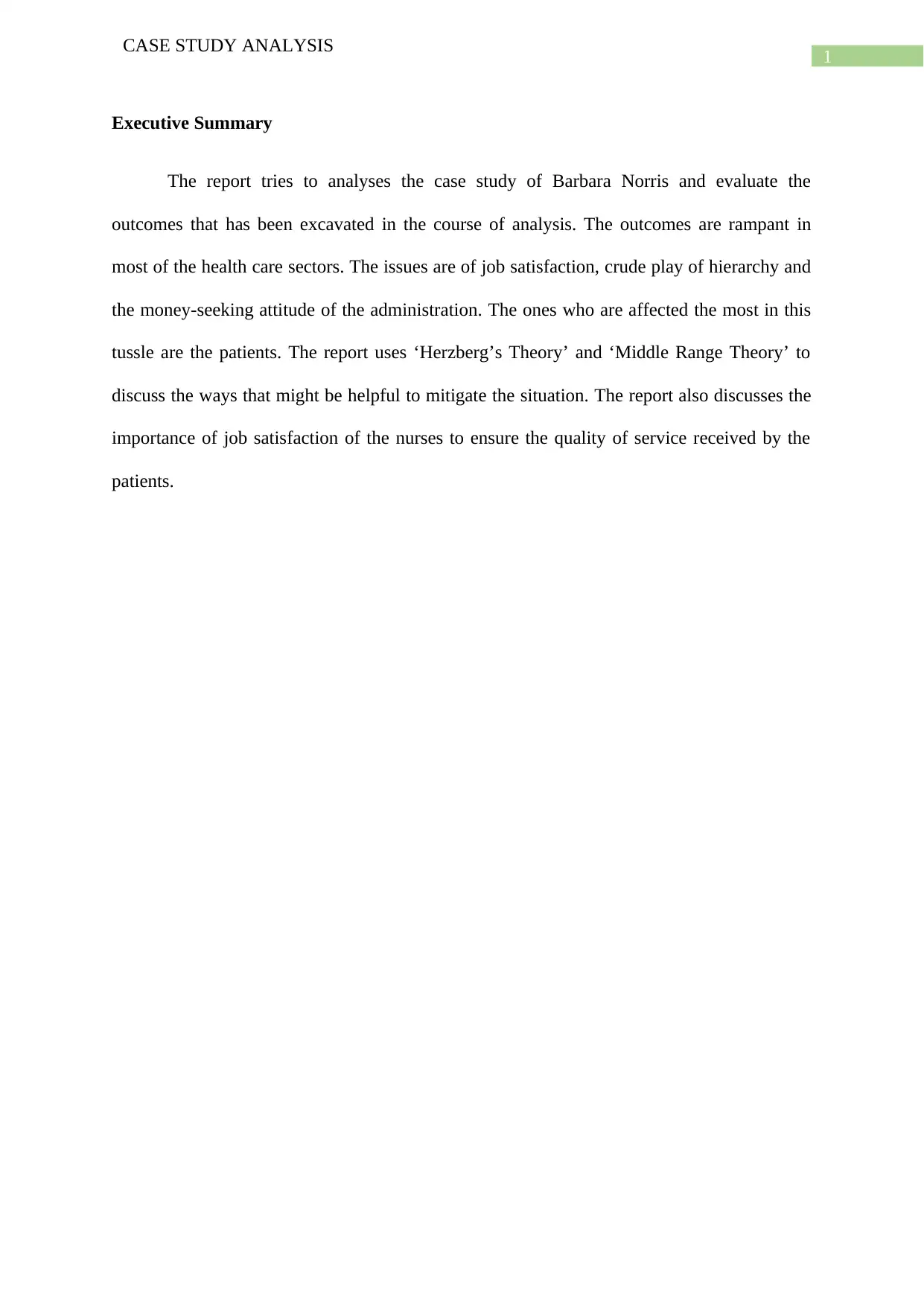
1
CASE STUDY ANALYSIS
Executive Summary
The report tries to analyses the case study of Barbara Norris and evaluate the
outcomes that has been excavated in the course of analysis. The outcomes are rampant in
most of the health care sectors. The issues are of job satisfaction, crude play of hierarchy and
the money-seeking attitude of the administration. The ones who are affected the most in this
tussle are the patients. The report uses ‘Herzberg’s Theory’ and ‘Middle Range Theory’ to
discuss the ways that might be helpful to mitigate the situation. The report also discusses the
importance of job satisfaction of the nurses to ensure the quality of service received by the
patients.
CASE STUDY ANALYSIS
Executive Summary
The report tries to analyses the case study of Barbara Norris and evaluate the
outcomes that has been excavated in the course of analysis. The outcomes are rampant in
most of the health care sectors. The issues are of job satisfaction, crude play of hierarchy and
the money-seeking attitude of the administration. The ones who are affected the most in this
tussle are the patients. The report uses ‘Herzberg’s Theory’ and ‘Middle Range Theory’ to
discuss the ways that might be helpful to mitigate the situation. The report also discusses the
importance of job satisfaction of the nurses to ensure the quality of service received by the
patients.
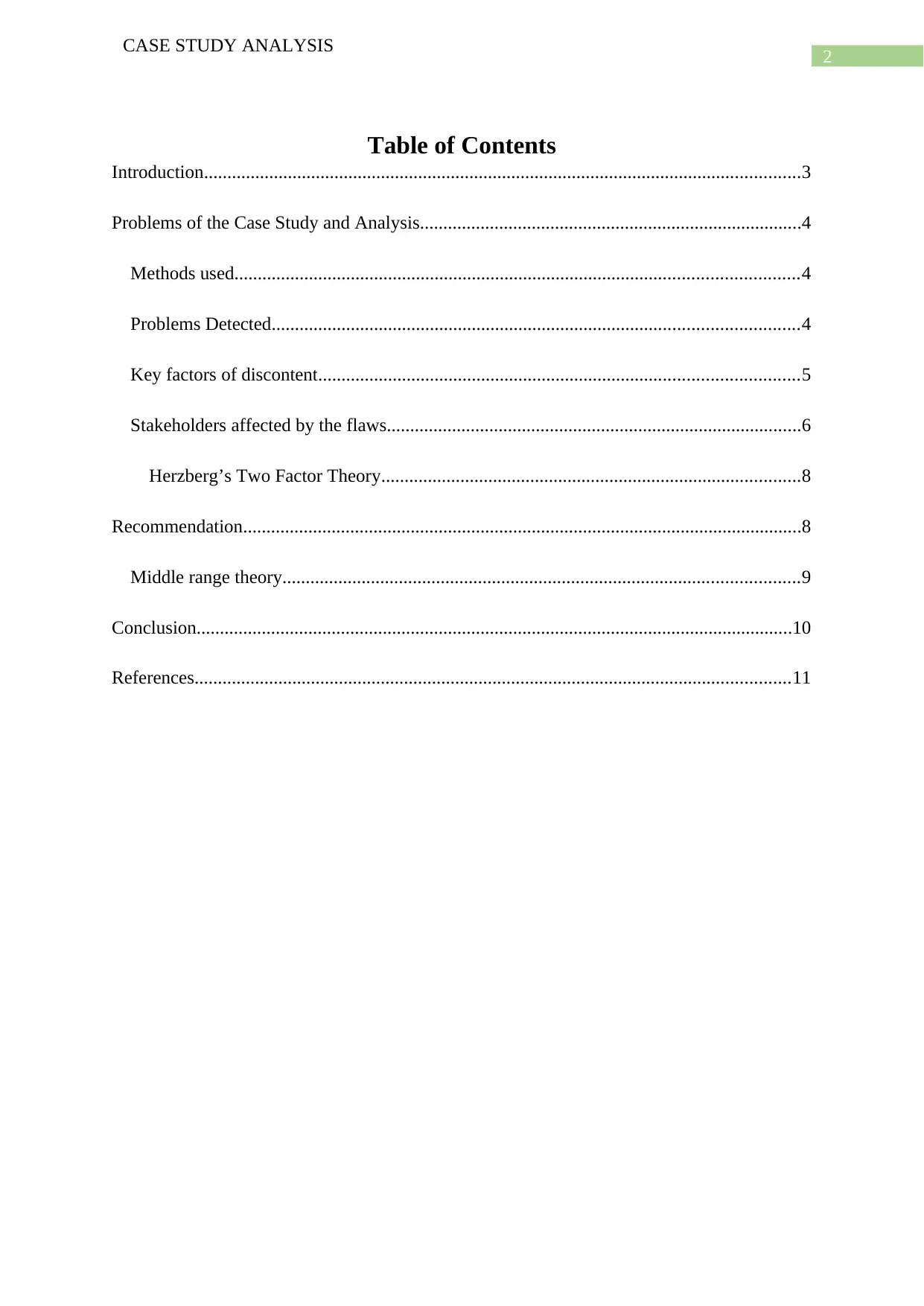
2
CASE STUDY ANALYSIS
Table of Contents
Introduction................................................................................................................................3
Problems of the Case Study and Analysis..................................................................................4
Methods used.........................................................................................................................4
Problems Detected.................................................................................................................4
Key factors of discontent.......................................................................................................5
Stakeholders affected by the flaws.........................................................................................6
Herzberg’s Two Factor Theory..........................................................................................8
Recommendation........................................................................................................................8
Middle range theory...............................................................................................................9
Conclusion................................................................................................................................10
References................................................................................................................................11
CASE STUDY ANALYSIS
Table of Contents
Introduction................................................................................................................................3
Problems of the Case Study and Analysis..................................................................................4
Methods used.........................................................................................................................4
Problems Detected.................................................................................................................4
Key factors of discontent.......................................................................................................5
Stakeholders affected by the flaws.........................................................................................6
Herzberg’s Two Factor Theory..........................................................................................8
Recommendation........................................................................................................................8
Middle range theory...............................................................................................................9
Conclusion................................................................................................................................10
References................................................................................................................................11
⊘ This is a preview!⊘
Do you want full access?
Subscribe today to unlock all pages.

Trusted by 1+ million students worldwide
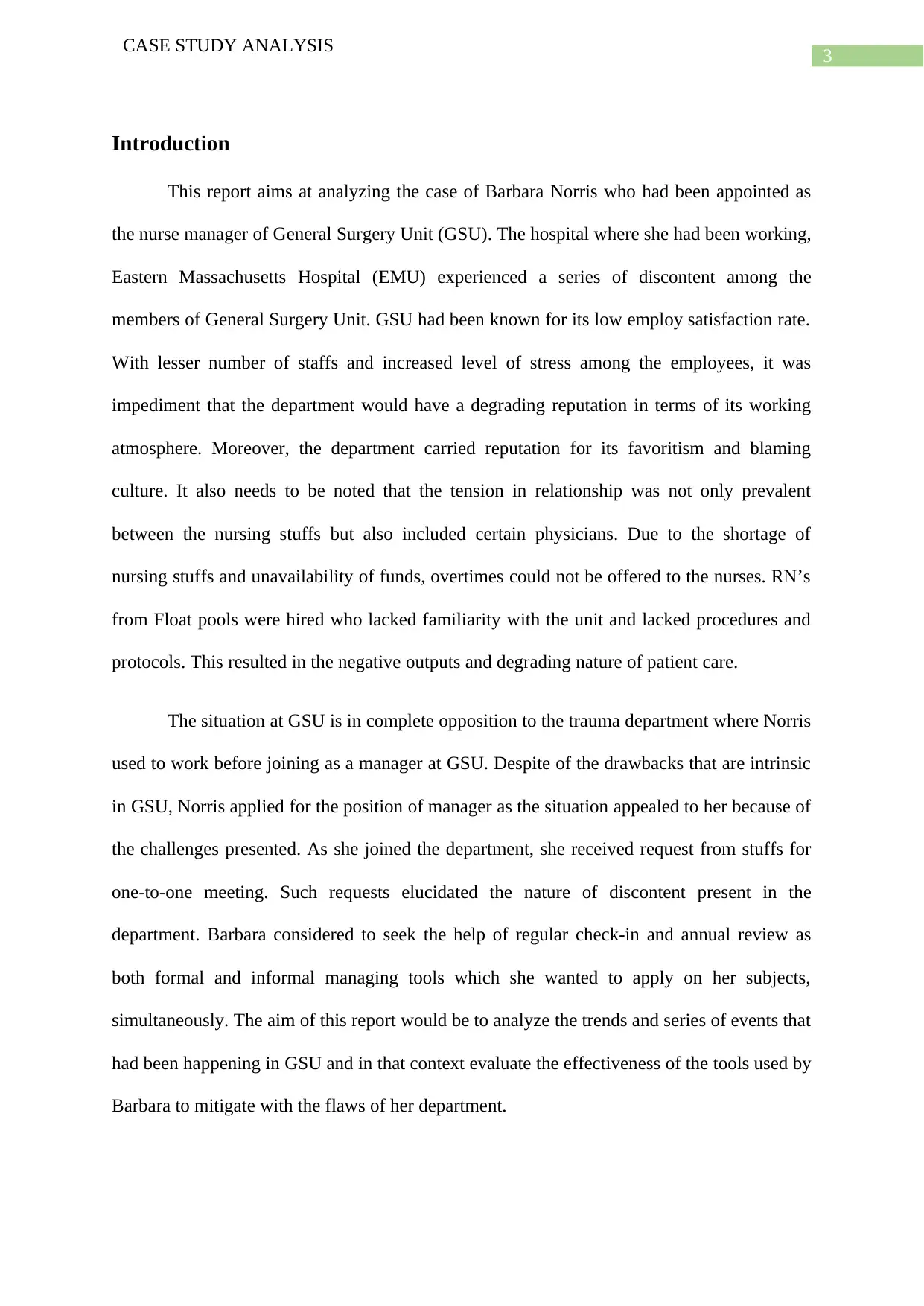
3
CASE STUDY ANALYSIS
Introduction
This report aims at analyzing the case of Barbara Norris who had been appointed as
the nurse manager of General Surgery Unit (GSU). The hospital where she had been working,
Eastern Massachusetts Hospital (EMU) experienced a series of discontent among the
members of General Surgery Unit. GSU had been known for its low employ satisfaction rate.
With lesser number of staffs and increased level of stress among the employees, it was
impediment that the department would have a degrading reputation in terms of its working
atmosphere. Moreover, the department carried reputation for its favoritism and blaming
culture. It also needs to be noted that the tension in relationship was not only prevalent
between the nursing stuffs but also included certain physicians. Due to the shortage of
nursing stuffs and unavailability of funds, overtimes could not be offered to the nurses. RN’s
from Float pools were hired who lacked familiarity with the unit and lacked procedures and
protocols. This resulted in the negative outputs and degrading nature of patient care.
The situation at GSU is in complete opposition to the trauma department where Norris
used to work before joining as a manager at GSU. Despite of the drawbacks that are intrinsic
in GSU, Norris applied for the position of manager as the situation appealed to her because of
the challenges presented. As she joined the department, she received request from stuffs for
one-to-one meeting. Such requests elucidated the nature of discontent present in the
department. Barbara considered to seek the help of regular check-in and annual review as
both formal and informal managing tools which she wanted to apply on her subjects,
simultaneously. The aim of this report would be to analyze the trends and series of events that
had been happening in GSU and in that context evaluate the effectiveness of the tools used by
Barbara to mitigate with the flaws of her department.
CASE STUDY ANALYSIS
Introduction
This report aims at analyzing the case of Barbara Norris who had been appointed as
the nurse manager of General Surgery Unit (GSU). The hospital where she had been working,
Eastern Massachusetts Hospital (EMU) experienced a series of discontent among the
members of General Surgery Unit. GSU had been known for its low employ satisfaction rate.
With lesser number of staffs and increased level of stress among the employees, it was
impediment that the department would have a degrading reputation in terms of its working
atmosphere. Moreover, the department carried reputation for its favoritism and blaming
culture. It also needs to be noted that the tension in relationship was not only prevalent
between the nursing stuffs but also included certain physicians. Due to the shortage of
nursing stuffs and unavailability of funds, overtimes could not be offered to the nurses. RN’s
from Float pools were hired who lacked familiarity with the unit and lacked procedures and
protocols. This resulted in the negative outputs and degrading nature of patient care.
The situation at GSU is in complete opposition to the trauma department where Norris
used to work before joining as a manager at GSU. Despite of the drawbacks that are intrinsic
in GSU, Norris applied for the position of manager as the situation appealed to her because of
the challenges presented. As she joined the department, she received request from stuffs for
one-to-one meeting. Such requests elucidated the nature of discontent present in the
department. Barbara considered to seek the help of regular check-in and annual review as
both formal and informal managing tools which she wanted to apply on her subjects,
simultaneously. The aim of this report would be to analyze the trends and series of events that
had been happening in GSU and in that context evaluate the effectiveness of the tools used by
Barbara to mitigate with the flaws of her department.
Paraphrase This Document
Need a fresh take? Get an instant paraphrase of this document with our AI Paraphraser
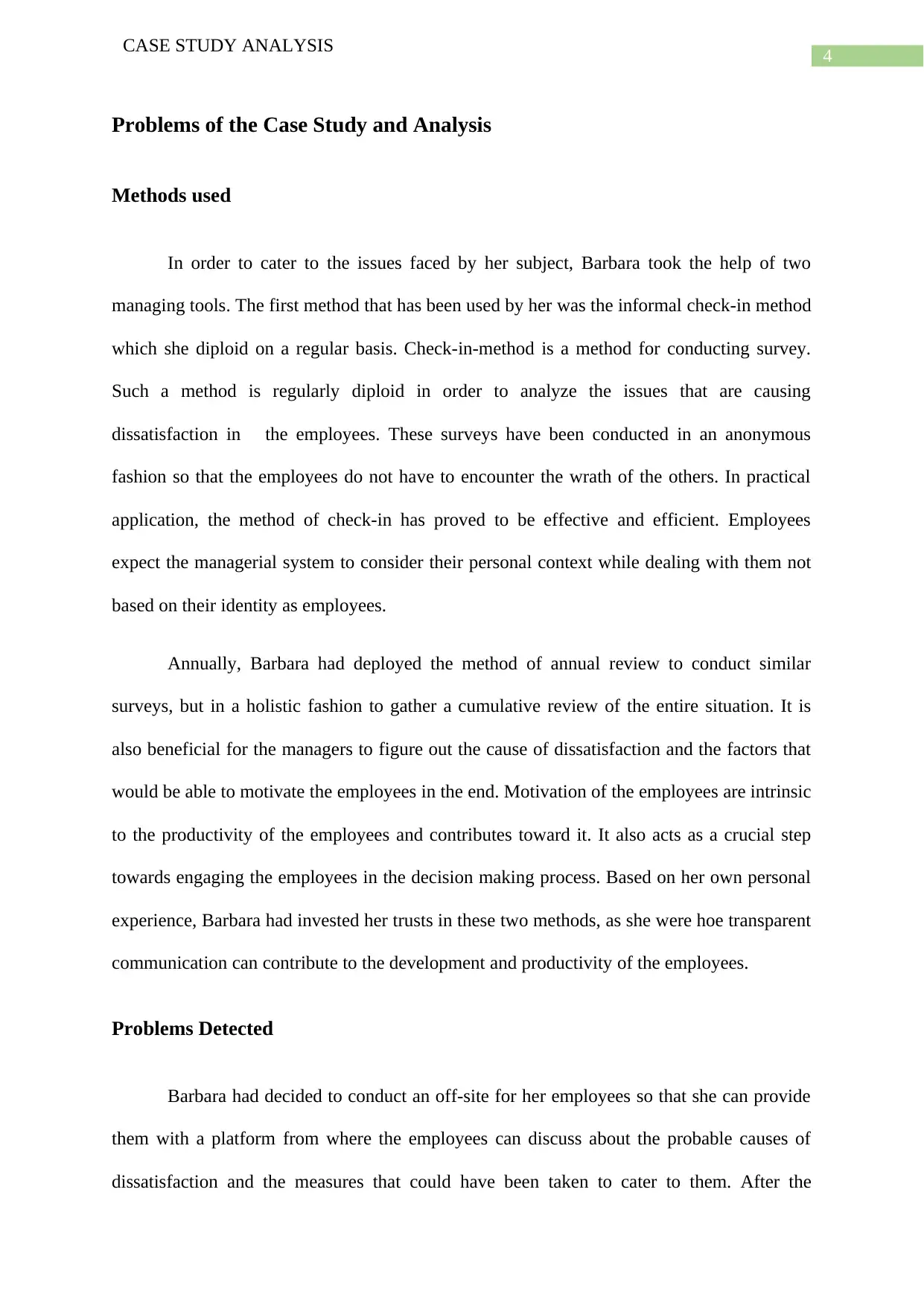
4
CASE STUDY ANALYSIS
Problems of the Case Study and Analysis
Methods used
In order to cater to the issues faced by her subject, Barbara took the help of two
managing tools. The first method that has been used by her was the informal check-in method
which she diploid on a regular basis. Check-in-method is a method for conducting survey.
Such a method is regularly diploid in order to analyze the issues that are causing
dissatisfaction in the employees. These surveys have been conducted in an anonymous
fashion so that the employees do not have to encounter the wrath of the others. In practical
application, the method of check-in has proved to be effective and efficient. Employees
expect the managerial system to consider their personal context while dealing with them not
based on their identity as employees.
Annually, Barbara had deployed the method of annual review to conduct similar
surveys, but in a holistic fashion to gather a cumulative review of the entire situation. It is
also beneficial for the managers to figure out the cause of dissatisfaction and the factors that
would be able to motivate the employees in the end. Motivation of the employees are intrinsic
to the productivity of the employees and contributes toward it. It also acts as a crucial step
towards engaging the employees in the decision making process. Based on her own personal
experience, Barbara had invested her trusts in these two methods, as she were hoe transparent
communication can contribute to the development and productivity of the employees.
Problems Detected
Barbara had decided to conduct an off-site for her employees so that she can provide
them with a platform from where the employees can discuss about the probable causes of
dissatisfaction and the measures that could have been taken to cater to them. After the
CASE STUDY ANALYSIS
Problems of the Case Study and Analysis
Methods used
In order to cater to the issues faced by her subject, Barbara took the help of two
managing tools. The first method that has been used by her was the informal check-in method
which she diploid on a regular basis. Check-in-method is a method for conducting survey.
Such a method is regularly diploid in order to analyze the issues that are causing
dissatisfaction in the employees. These surveys have been conducted in an anonymous
fashion so that the employees do not have to encounter the wrath of the others. In practical
application, the method of check-in has proved to be effective and efficient. Employees
expect the managerial system to consider their personal context while dealing with them not
based on their identity as employees.
Annually, Barbara had deployed the method of annual review to conduct similar
surveys, but in a holistic fashion to gather a cumulative review of the entire situation. It is
also beneficial for the managers to figure out the cause of dissatisfaction and the factors that
would be able to motivate the employees in the end. Motivation of the employees are intrinsic
to the productivity of the employees and contributes toward it. It also acts as a crucial step
towards engaging the employees in the decision making process. Based on her own personal
experience, Barbara had invested her trusts in these two methods, as she were hoe transparent
communication can contribute to the development and productivity of the employees.
Problems Detected
Barbara had decided to conduct an off-site for her employees so that she can provide
them with a platform from where the employees can discuss about the probable causes of
dissatisfaction and the measures that could have been taken to cater to them. After the
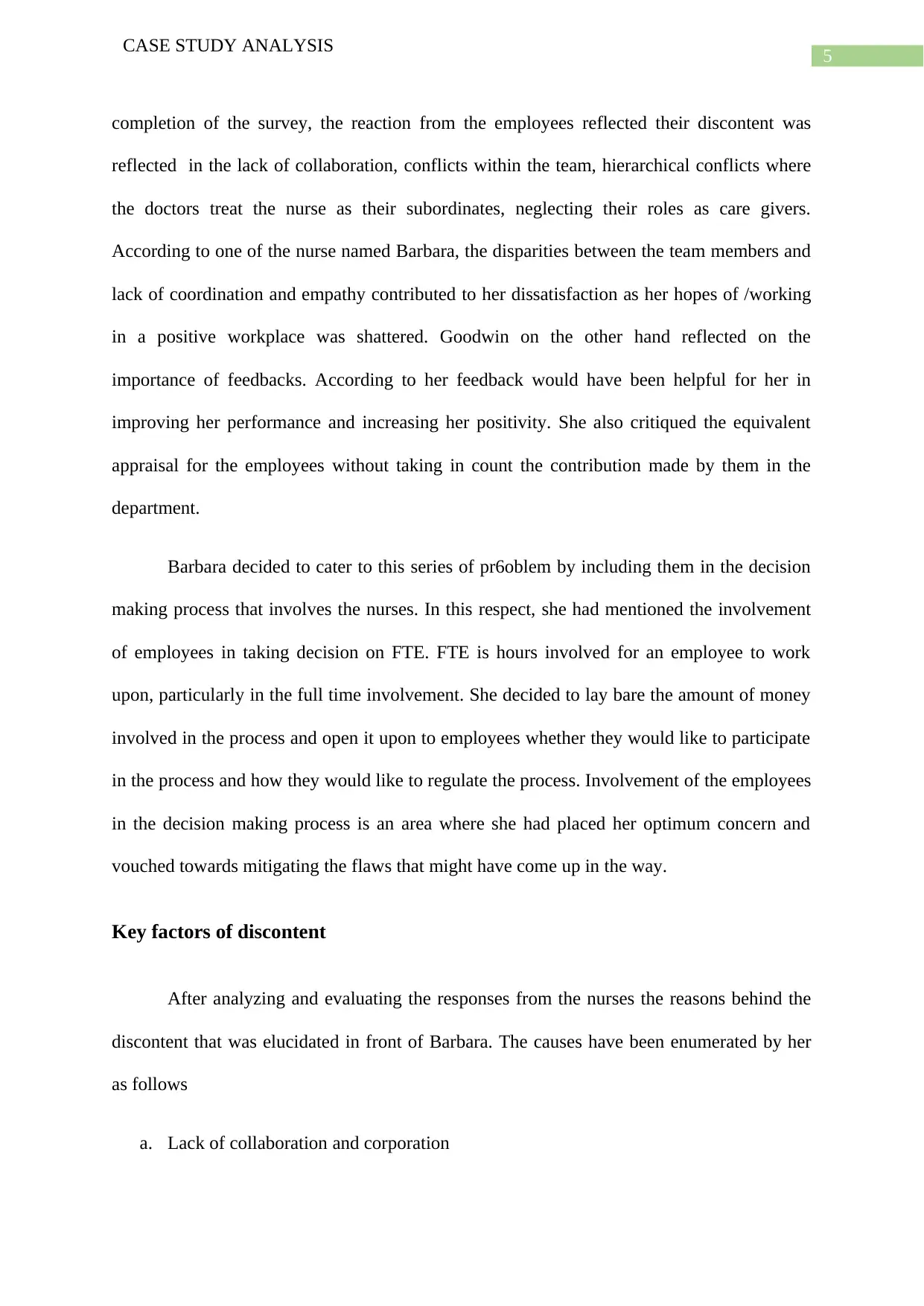
5
CASE STUDY ANALYSIS
completion of the survey, the reaction from the employees reflected their discontent was
reflected in the lack of collaboration, conflicts within the team, hierarchical conflicts where
the doctors treat the nurse as their subordinates, neglecting their roles as care givers.
According to one of the nurse named Barbara, the disparities between the team members and
lack of coordination and empathy contributed to her dissatisfaction as her hopes of /working
in a positive workplace was shattered. Goodwin on the other hand reflected on the
importance of feedbacks. According to her feedback would have been helpful for her in
improving her performance and increasing her positivity. She also critiqued the equivalent
appraisal for the employees without taking in count the contribution made by them in the
department.
Barbara decided to cater to this series of pr6oblem by including them in the decision
making process that involves the nurses. In this respect, she had mentioned the involvement
of employees in taking decision on FTE. FTE is hours involved for an employee to work
upon, particularly in the full time involvement. She decided to lay bare the amount of money
involved in the process and open it upon to employees whether they would like to participate
in the process and how they would like to regulate the process. Involvement of the employees
in the decision making process is an area where she had placed her optimum concern and
vouched towards mitigating the flaws that might have come up in the way.
Key factors of discontent
After analyzing and evaluating the responses from the nurses the reasons behind the
discontent that was elucidated in front of Barbara. The causes have been enumerated by her
as follows
a. Lack of collaboration and corporation
CASE STUDY ANALYSIS
completion of the survey, the reaction from the employees reflected their discontent was
reflected in the lack of collaboration, conflicts within the team, hierarchical conflicts where
the doctors treat the nurse as their subordinates, neglecting their roles as care givers.
According to one of the nurse named Barbara, the disparities between the team members and
lack of coordination and empathy contributed to her dissatisfaction as her hopes of /working
in a positive workplace was shattered. Goodwin on the other hand reflected on the
importance of feedbacks. According to her feedback would have been helpful for her in
improving her performance and increasing her positivity. She also critiqued the equivalent
appraisal for the employees without taking in count the contribution made by them in the
department.
Barbara decided to cater to this series of pr6oblem by including them in the decision
making process that involves the nurses. In this respect, she had mentioned the involvement
of employees in taking decision on FTE. FTE is hours involved for an employee to work
upon, particularly in the full time involvement. She decided to lay bare the amount of money
involved in the process and open it upon to employees whether they would like to participate
in the process and how they would like to regulate the process. Involvement of the employees
in the decision making process is an area where she had placed her optimum concern and
vouched towards mitigating the flaws that might have come up in the way.
Key factors of discontent
After analyzing and evaluating the responses from the nurses the reasons behind the
discontent that was elucidated in front of Barbara. The causes have been enumerated by her
as follows
a. Lack of collaboration and corporation
⊘ This is a preview!⊘
Do you want full access?
Subscribe today to unlock all pages.

Trusted by 1+ million students worldwide
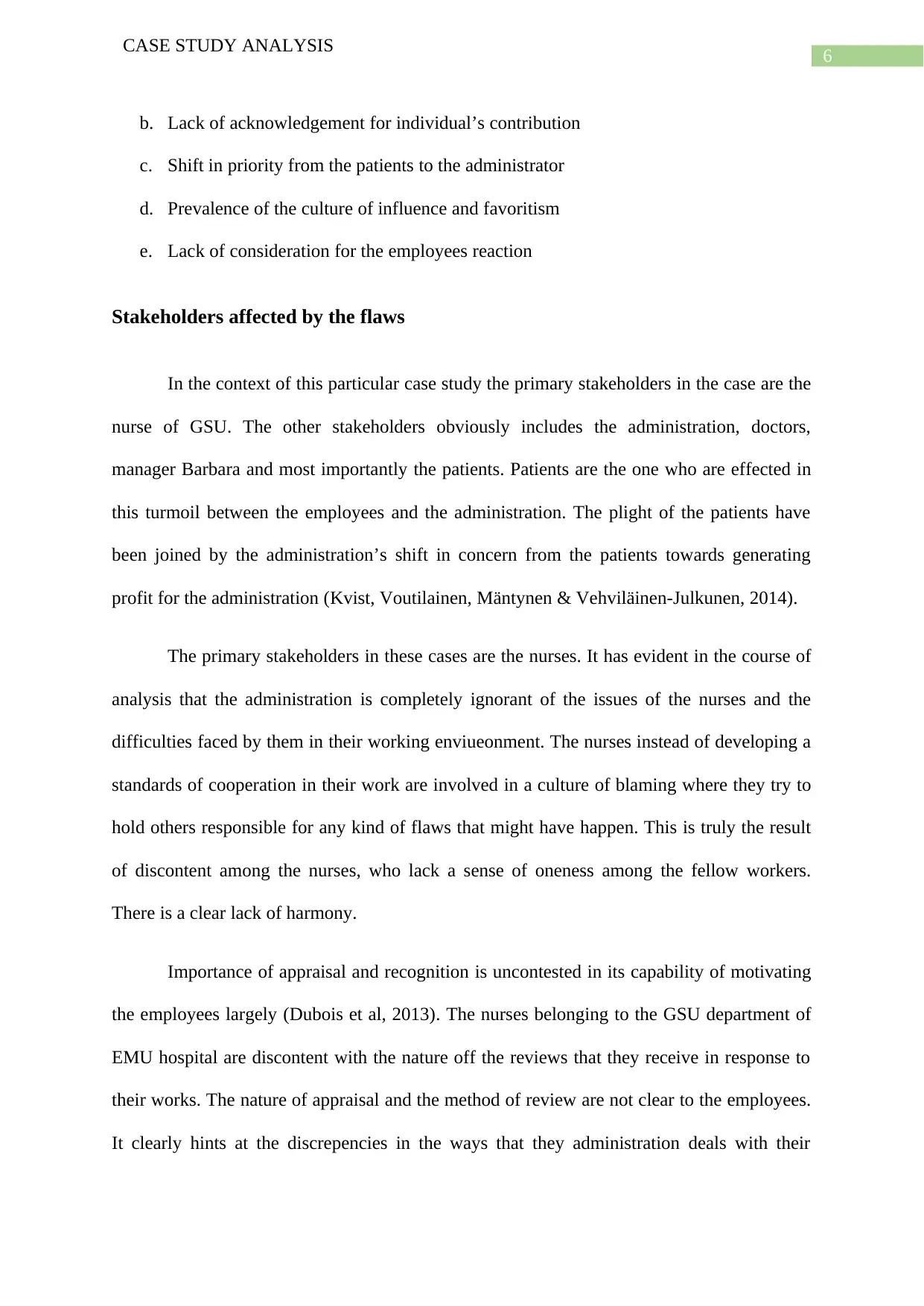
6
CASE STUDY ANALYSIS
b. Lack of acknowledgement for individual’s contribution
c. Shift in priority from the patients to the administrator
d. Prevalence of the culture of influence and favoritism
e. Lack of consideration for the employees reaction
Stakeholders affected by the flaws
In the context of this particular case study the primary stakeholders in the case are the
nurse of GSU. The other stakeholders obviously includes the administration, doctors,
manager Barbara and most importantly the patients. Patients are the one who are effected in
this turmoil between the employees and the administration. The plight of the patients have
been joined by the administration’s shift in concern from the patients towards generating
profit for the administration (Kvist, Voutilainen, Mäntynen & Vehviläinen-Julkunen, 2014).
The primary stakeholders in these cases are the nurses. It has evident in the course of
analysis that the administration is completely ignorant of the issues of the nurses and the
difficulties faced by them in their working enviueonment. The nurses instead of developing a
standards of cooperation in their work are involved in a culture of blaming where they try to
hold others responsible for any kind of flaws that might have happen. This is truly the result
of discontent among the nurses, who lack a sense of oneness among the fellow workers.
There is a clear lack of harmony.
Importance of appraisal and recognition is uncontested in its capability of motivating
the employees largely (Dubois et al, 2013). The nurses belonging to the GSU department of
EMU hospital are discontent with the nature off the reviews that they receive in response to
their works. The nature of appraisal and the method of review are not clear to the employees.
It clearly hints at the discrepencies in the ways that they administration deals with their
CASE STUDY ANALYSIS
b. Lack of acknowledgement for individual’s contribution
c. Shift in priority from the patients to the administrator
d. Prevalence of the culture of influence and favoritism
e. Lack of consideration for the employees reaction
Stakeholders affected by the flaws
In the context of this particular case study the primary stakeholders in the case are the
nurse of GSU. The other stakeholders obviously includes the administration, doctors,
manager Barbara and most importantly the patients. Patients are the one who are effected in
this turmoil between the employees and the administration. The plight of the patients have
been joined by the administration’s shift in concern from the patients towards generating
profit for the administration (Kvist, Voutilainen, Mäntynen & Vehviläinen-Julkunen, 2014).
The primary stakeholders in these cases are the nurses. It has evident in the course of
analysis that the administration is completely ignorant of the issues of the nurses and the
difficulties faced by them in their working enviueonment. The nurses instead of developing a
standards of cooperation in their work are involved in a culture of blaming where they try to
hold others responsible for any kind of flaws that might have happen. This is truly the result
of discontent among the nurses, who lack a sense of oneness among the fellow workers.
There is a clear lack of harmony.
Importance of appraisal and recognition is uncontested in its capability of motivating
the employees largely (Dubois et al, 2013). The nurses belonging to the GSU department of
EMU hospital are discontent with the nature off the reviews that they receive in response to
their works. The nature of appraisal and the method of review are not clear to the employees.
It clearly hints at the discrepencies in the ways that they administration deals with their
Paraphrase This Document
Need a fresh take? Get an instant paraphrase of this document with our AI Paraphraser
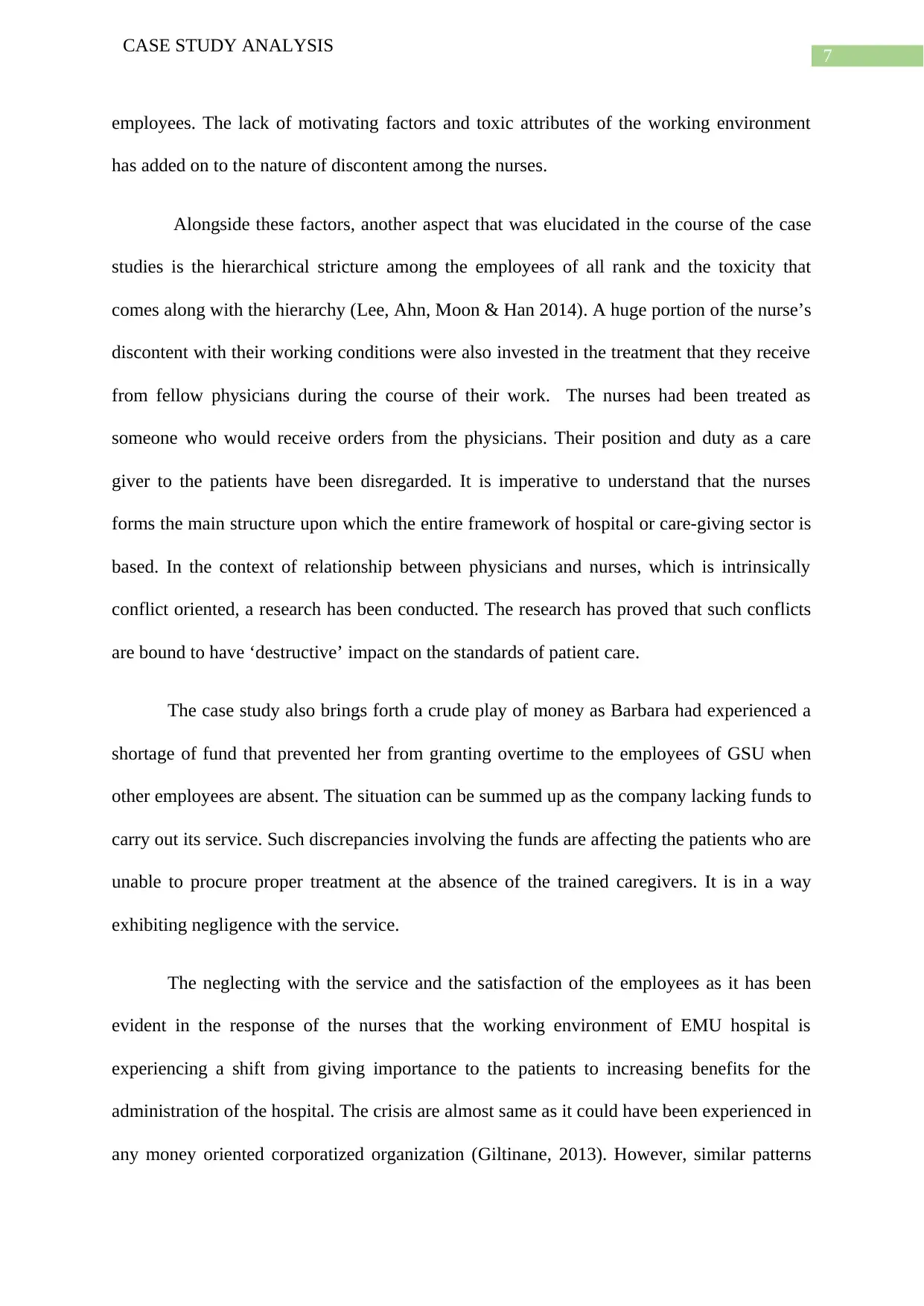
7
CASE STUDY ANALYSIS
employees. The lack of motivating factors and toxic attributes of the working environment
has added on to the nature of discontent among the nurses.
Alongside these factors, another aspect that was elucidated in the course of the case
studies is the hierarchical stricture among the employees of all rank and the toxicity that
comes along with the hierarchy (Lee, Ahn, Moon & Han 2014). A huge portion of the nurse’s
discontent with their working conditions were also invested in the treatment that they receive
from fellow physicians during the course of their work. The nurses had been treated as
someone who would receive orders from the physicians. Their position and duty as a care
giver to the patients have been disregarded. It is imperative to understand that the nurses
forms the main structure upon which the entire framework of hospital or care-giving sector is
based. In the context of relationship between physicians and nurses, which is intrinsically
conflict oriented, a research has been conducted. The research has proved that such conflicts
are bound to have ‘destructive’ impact on the standards of patient care.
The case study also brings forth a crude play of money as Barbara had experienced a
shortage of fund that prevented her from granting overtime to the employees of GSU when
other employees are absent. The situation can be summed up as the company lacking funds to
carry out its service. Such discrepancies involving the funds are affecting the patients who are
unable to procure proper treatment at the absence of the trained caregivers. It is in a way
exhibiting negligence with the service.
The neglecting with the service and the satisfaction of the employees as it has been
evident in the response of the nurses that the working environment of EMU hospital is
experiencing a shift from giving importance to the patients to increasing benefits for the
administration of the hospital. The crisis are almost same as it could have been experienced in
any money oriented corporatized organization (Giltinane, 2013). However, similar patterns
CASE STUDY ANALYSIS
employees. The lack of motivating factors and toxic attributes of the working environment
has added on to the nature of discontent among the nurses.
Alongside these factors, another aspect that was elucidated in the course of the case
studies is the hierarchical stricture among the employees of all rank and the toxicity that
comes along with the hierarchy (Lee, Ahn, Moon & Han 2014). A huge portion of the nurse’s
discontent with their working conditions were also invested in the treatment that they receive
from fellow physicians during the course of their work. The nurses had been treated as
someone who would receive orders from the physicians. Their position and duty as a care
giver to the patients have been disregarded. It is imperative to understand that the nurses
forms the main structure upon which the entire framework of hospital or care-giving sector is
based. In the context of relationship between physicians and nurses, which is intrinsically
conflict oriented, a research has been conducted. The research has proved that such conflicts
are bound to have ‘destructive’ impact on the standards of patient care.
The case study also brings forth a crude play of money as Barbara had experienced a
shortage of fund that prevented her from granting overtime to the employees of GSU when
other employees are absent. The situation can be summed up as the company lacking funds to
carry out its service. Such discrepancies involving the funds are affecting the patients who are
unable to procure proper treatment at the absence of the trained caregivers. It is in a way
exhibiting negligence with the service.
The neglecting with the service and the satisfaction of the employees as it has been
evident in the response of the nurses that the working environment of EMU hospital is
experiencing a shift from giving importance to the patients to increasing benefits for the
administration of the hospital. The crisis are almost same as it could have been experienced in
any money oriented corporatized organization (Giltinane, 2013). However, similar patterns
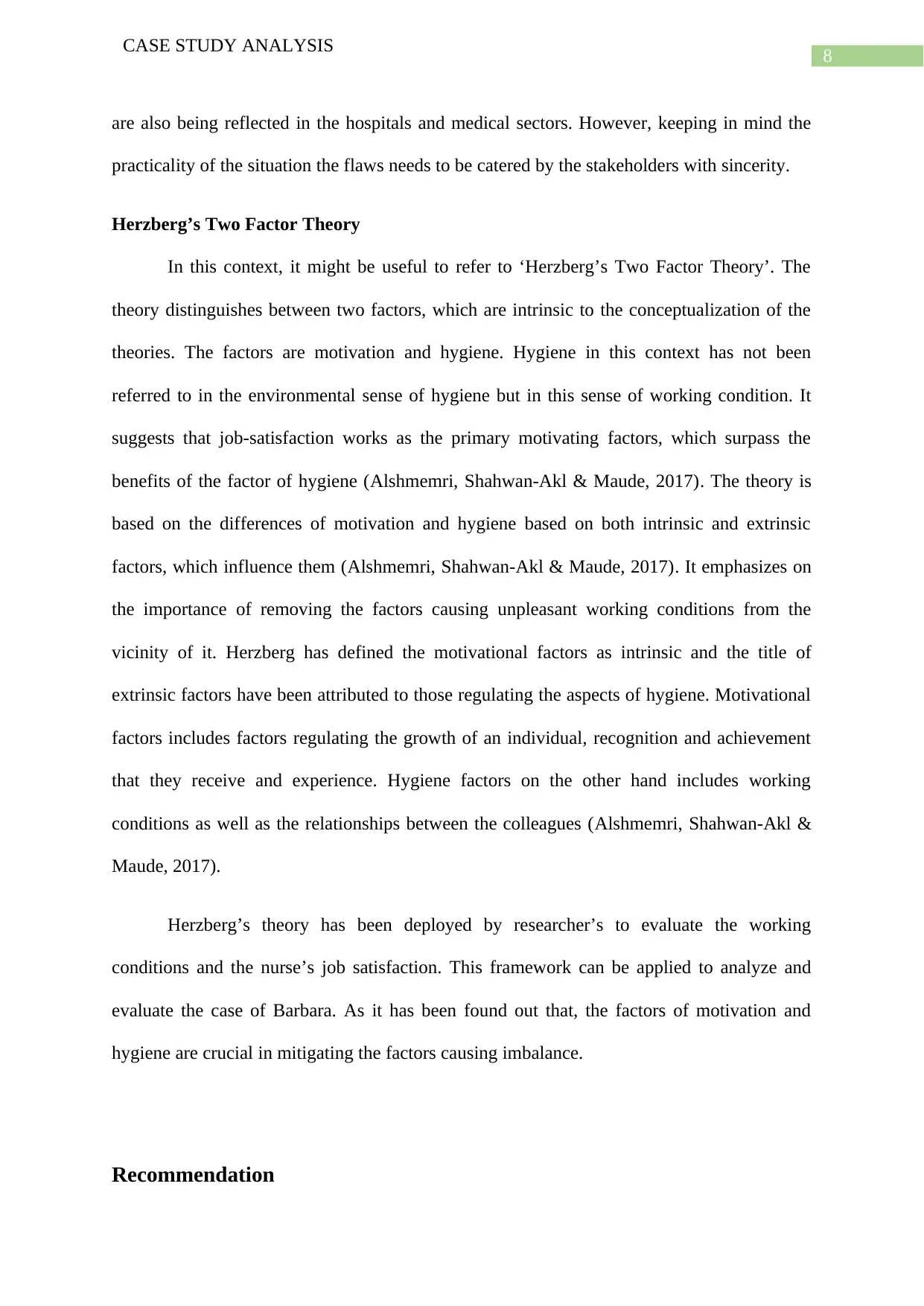
8
CASE STUDY ANALYSIS
are also being reflected in the hospitals and medical sectors. However, keeping in mind the
practicality of the situation the flaws needs to be catered by the stakeholders with sincerity.
Herzberg’s Two Factor Theory
In this context, it might be useful to refer to ‘Herzberg’s Two Factor Theory’. The
theory distinguishes between two factors, which are intrinsic to the conceptualization of the
theories. The factors are motivation and hygiene. Hygiene in this context has not been
referred to in the environmental sense of hygiene but in this sense of working condition. It
suggests that job-satisfaction works as the primary motivating factors, which surpass the
benefits of the factor of hygiene (Alshmemri, Shahwan-Akl & Maude, 2017). The theory is
based on the differences of motivation and hygiene based on both intrinsic and extrinsic
factors, which influence them (Alshmemri, Shahwan-Akl & Maude, 2017). It emphasizes on
the importance of removing the factors causing unpleasant working conditions from the
vicinity of it. Herzberg has defined the motivational factors as intrinsic and the title of
extrinsic factors have been attributed to those regulating the aspects of hygiene. Motivational
factors includes factors regulating the growth of an individual, recognition and achievement
that they receive and experience. Hygiene factors on the other hand includes working
conditions as well as the relationships between the colleagues (Alshmemri, Shahwan-Akl &
Maude, 2017).
Herzberg’s theory has been deployed by researcher’s to evaluate the working
conditions and the nurse’s job satisfaction. This framework can be applied to analyze and
evaluate the case of Barbara. As it has been found out that, the factors of motivation and
hygiene are crucial in mitigating the factors causing imbalance.
Recommendation
CASE STUDY ANALYSIS
are also being reflected in the hospitals and medical sectors. However, keeping in mind the
practicality of the situation the flaws needs to be catered by the stakeholders with sincerity.
Herzberg’s Two Factor Theory
In this context, it might be useful to refer to ‘Herzberg’s Two Factor Theory’. The
theory distinguishes between two factors, which are intrinsic to the conceptualization of the
theories. The factors are motivation and hygiene. Hygiene in this context has not been
referred to in the environmental sense of hygiene but in this sense of working condition. It
suggests that job-satisfaction works as the primary motivating factors, which surpass the
benefits of the factor of hygiene (Alshmemri, Shahwan-Akl & Maude, 2017). The theory is
based on the differences of motivation and hygiene based on both intrinsic and extrinsic
factors, which influence them (Alshmemri, Shahwan-Akl & Maude, 2017). It emphasizes on
the importance of removing the factors causing unpleasant working conditions from the
vicinity of it. Herzberg has defined the motivational factors as intrinsic and the title of
extrinsic factors have been attributed to those regulating the aspects of hygiene. Motivational
factors includes factors regulating the growth of an individual, recognition and achievement
that they receive and experience. Hygiene factors on the other hand includes working
conditions as well as the relationships between the colleagues (Alshmemri, Shahwan-Akl &
Maude, 2017).
Herzberg’s theory has been deployed by researcher’s to evaluate the working
conditions and the nurse’s job satisfaction. This framework can be applied to analyze and
evaluate the case of Barbara. As it has been found out that, the factors of motivation and
hygiene are crucial in mitigating the factors causing imbalance.
Recommendation
⊘ This is a preview!⊘
Do you want full access?
Subscribe today to unlock all pages.

Trusted by 1+ million students worldwide
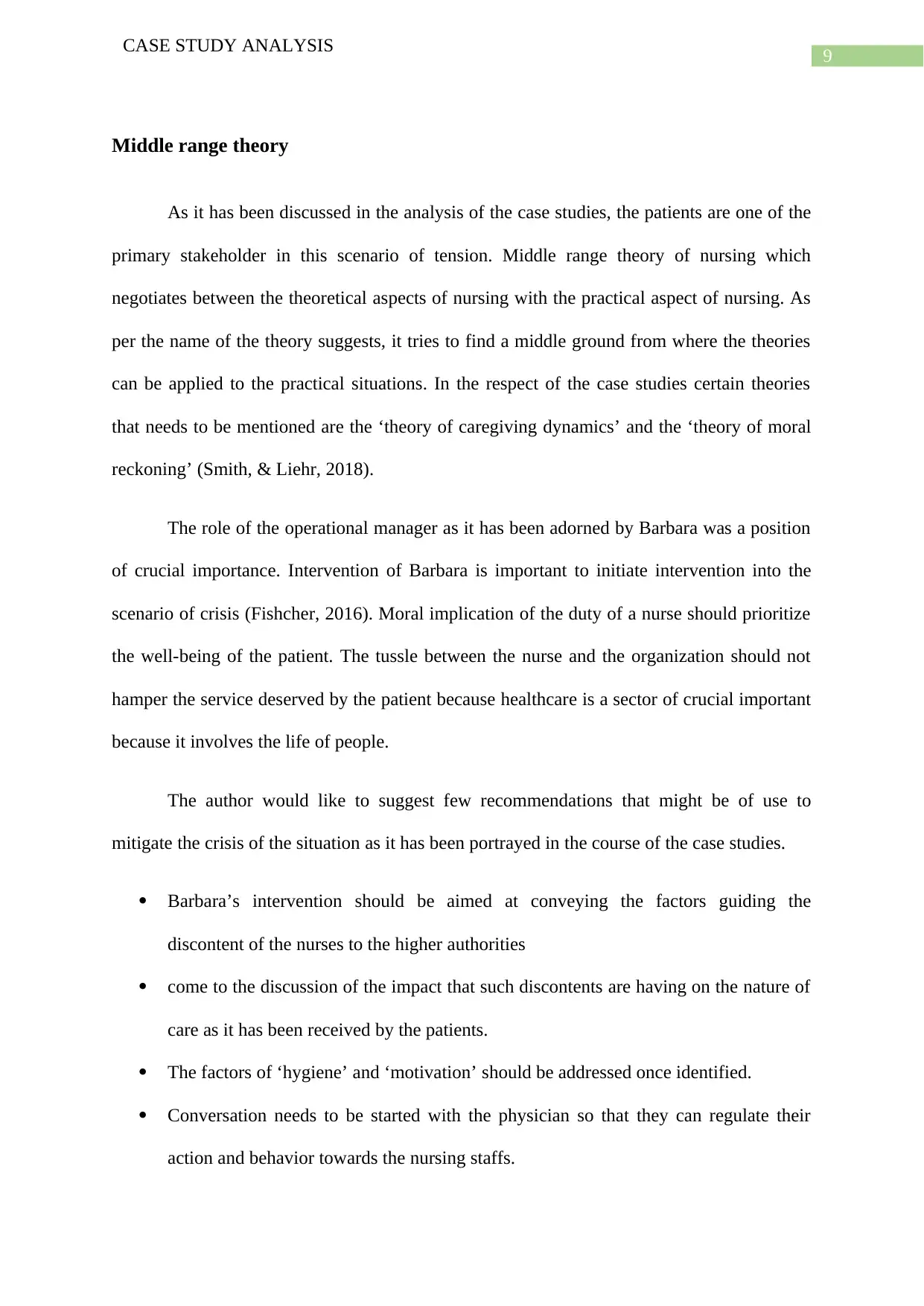
9
CASE STUDY ANALYSIS
Middle range theory
As it has been discussed in the analysis of the case studies, the patients are one of the
primary stakeholder in this scenario of tension. Middle range theory of nursing which
negotiates between the theoretical aspects of nursing with the practical aspect of nursing. As
per the name of the theory suggests, it tries to find a middle ground from where the theories
can be applied to the practical situations. In the respect of the case studies certain theories
that needs to be mentioned are the ‘theory of caregiving dynamics’ and the ‘theory of moral
reckoning’ (Smith, & Liehr, 2018).
The role of the operational manager as it has been adorned by Barbara was a position
of crucial importance. Intervention of Barbara is important to initiate intervention into the
scenario of crisis (Fishcher, 2016). Moral implication of the duty of a nurse should prioritize
the well-being of the patient. The tussle between the nurse and the organization should not
hamper the service deserved by the patient because healthcare is a sector of crucial important
because it involves the life of people.
The author would like to suggest few recommendations that might be of use to
mitigate the crisis of the situation as it has been portrayed in the course of the case studies.
Barbara’s intervention should be aimed at conveying the factors guiding the
discontent of the nurses to the higher authorities
come to the discussion of the impact that such discontents are having on the nature of
care as it has been received by the patients.
The factors of ‘hygiene’ and ‘motivation’ should be addressed once identified.
Conversation needs to be started with the physician so that they can regulate their
action and behavior towards the nursing staffs.
CASE STUDY ANALYSIS
Middle range theory
As it has been discussed in the analysis of the case studies, the patients are one of the
primary stakeholder in this scenario of tension. Middle range theory of nursing which
negotiates between the theoretical aspects of nursing with the practical aspect of nursing. As
per the name of the theory suggests, it tries to find a middle ground from where the theories
can be applied to the practical situations. In the respect of the case studies certain theories
that needs to be mentioned are the ‘theory of caregiving dynamics’ and the ‘theory of moral
reckoning’ (Smith, & Liehr, 2018).
The role of the operational manager as it has been adorned by Barbara was a position
of crucial importance. Intervention of Barbara is important to initiate intervention into the
scenario of crisis (Fishcher, 2016). Moral implication of the duty of a nurse should prioritize
the well-being of the patient. The tussle between the nurse and the organization should not
hamper the service deserved by the patient because healthcare is a sector of crucial important
because it involves the life of people.
The author would like to suggest few recommendations that might be of use to
mitigate the crisis of the situation as it has been portrayed in the course of the case studies.
Barbara’s intervention should be aimed at conveying the factors guiding the
discontent of the nurses to the higher authorities
come to the discussion of the impact that such discontents are having on the nature of
care as it has been received by the patients.
The factors of ‘hygiene’ and ‘motivation’ should be addressed once identified.
Conversation needs to be started with the physician so that they can regulate their
action and behavior towards the nursing staffs.
Paraphrase This Document
Need a fresh take? Get an instant paraphrase of this document with our AI Paraphraser
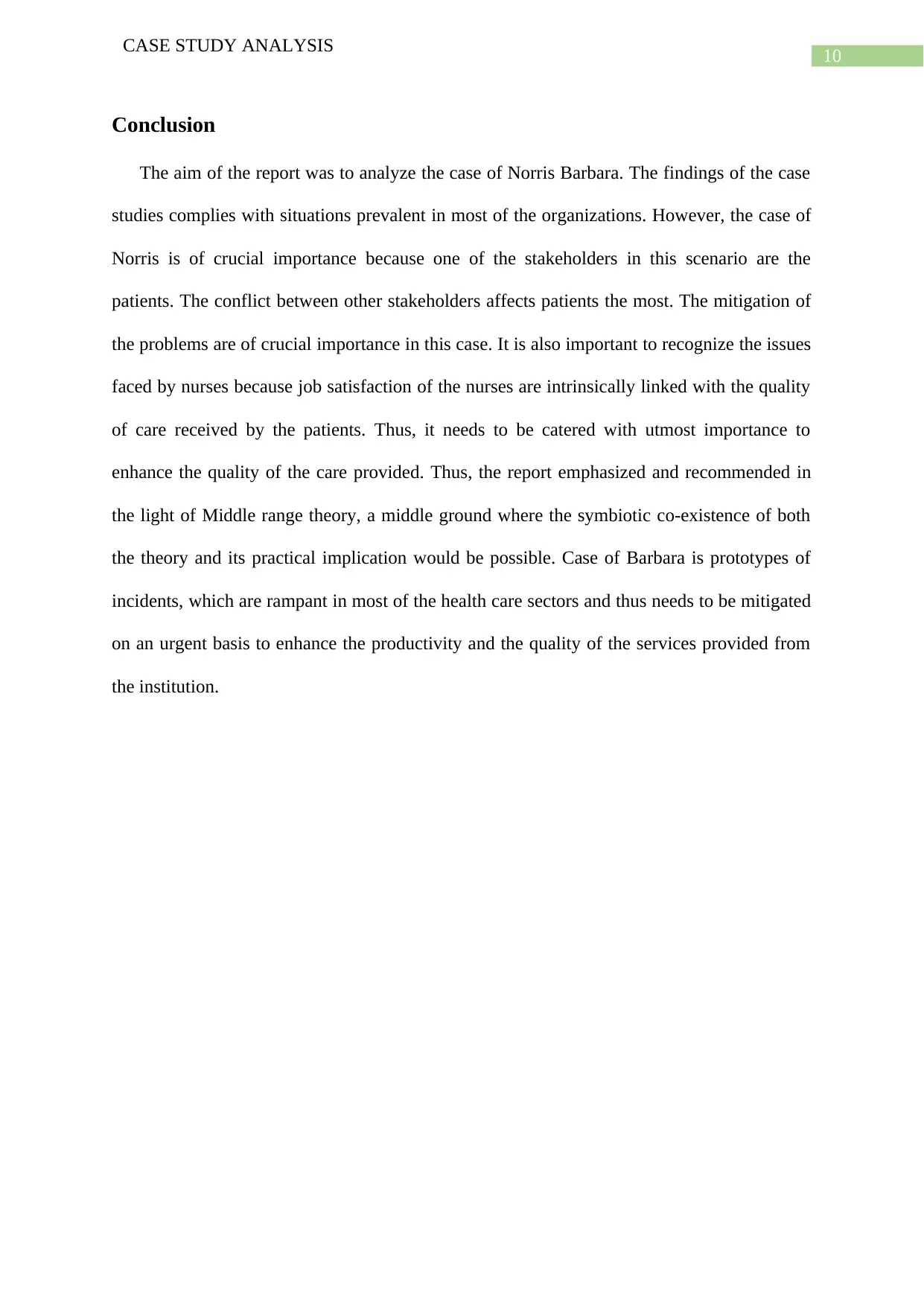
10
CASE STUDY ANALYSIS
Conclusion
The aim of the report was to analyze the case of Norris Barbara. The findings of the case
studies complies with situations prevalent in most of the organizations. However, the case of
Norris is of crucial importance because one of the stakeholders in this scenario are the
patients. The conflict between other stakeholders affects patients the most. The mitigation of
the problems are of crucial importance in this case. It is also important to recognize the issues
faced by nurses because job satisfaction of the nurses are intrinsically linked with the quality
of care received by the patients. Thus, it needs to be catered with utmost importance to
enhance the quality of the care provided. Thus, the report emphasized and recommended in
the light of Middle range theory, a middle ground where the symbiotic co-existence of both
the theory and its practical implication would be possible. Case of Barbara is prototypes of
incidents, which are rampant in most of the health care sectors and thus needs to be mitigated
on an urgent basis to enhance the productivity and the quality of the services provided from
the institution.
CASE STUDY ANALYSIS
Conclusion
The aim of the report was to analyze the case of Norris Barbara. The findings of the case
studies complies with situations prevalent in most of the organizations. However, the case of
Norris is of crucial importance because one of the stakeholders in this scenario are the
patients. The conflict between other stakeholders affects patients the most. The mitigation of
the problems are of crucial importance in this case. It is also important to recognize the issues
faced by nurses because job satisfaction of the nurses are intrinsically linked with the quality
of care received by the patients. Thus, it needs to be catered with utmost importance to
enhance the quality of the care provided. Thus, the report emphasized and recommended in
the light of Middle range theory, a middle ground where the symbiotic co-existence of both
the theory and its practical implication would be possible. Case of Barbara is prototypes of
incidents, which are rampant in most of the health care sectors and thus needs to be mitigated
on an urgent basis to enhance the productivity and the quality of the services provided from
the institution.
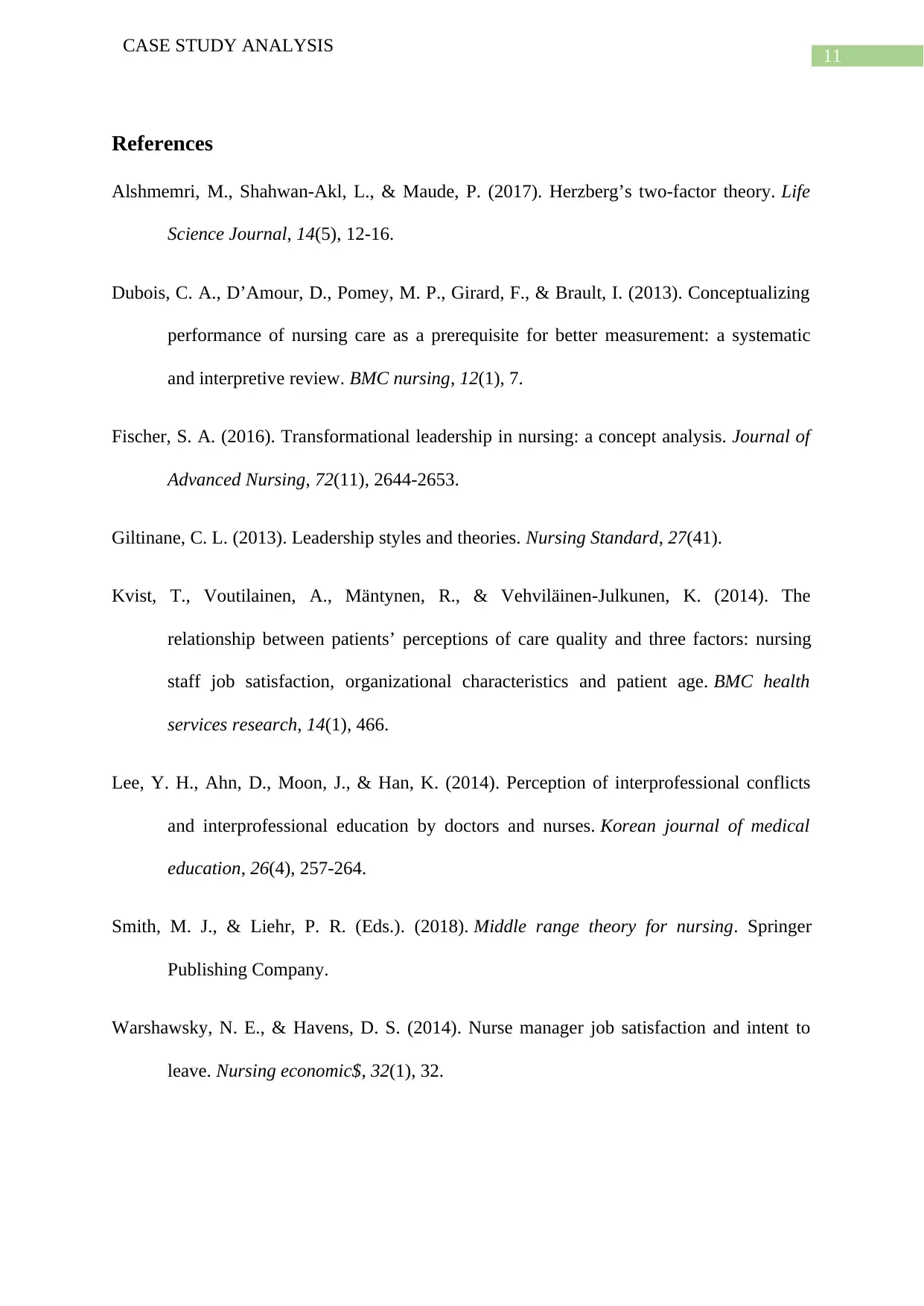
11
CASE STUDY ANALYSIS
References
Alshmemri, M., Shahwan-Akl, L., & Maude, P. (2017). Herzberg’s two-factor theory. Life
Science Journal, 14(5), 12-16.
Dubois, C. A., D’Amour, D., Pomey, M. P., Girard, F., & Brault, I. (2013). Conceptualizing
performance of nursing care as a prerequisite for better measurement: a systematic
and interpretive review. BMC nursing, 12(1), 7.
Fischer, S. A. (2016). Transformational leadership in nursing: a concept analysis. Journal of
Advanced Nursing, 72(11), 2644-2653.
Giltinane, C. L. (2013). Leadership styles and theories. Nursing Standard, 27(41).
Kvist, T., Voutilainen, A., Mäntynen, R., & Vehviläinen-Julkunen, K. (2014). The
relationship between patients’ perceptions of care quality and three factors: nursing
staff job satisfaction, organizational characteristics and patient age. BMC health
services research, 14(1), 466.
Lee, Y. H., Ahn, D., Moon, J., & Han, K. (2014). Perception of interprofessional conflicts
and interprofessional education by doctors and nurses. Korean journal of medical
education, 26(4), 257-264.
Smith, M. J., & Liehr, P. R. (Eds.). (2018). Middle range theory for nursing. Springer
Publishing Company.
Warshawsky, N. E., & Havens, D. S. (2014). Nurse manager job satisfaction and intent to
leave. Nursing economic$, 32(1), 32.
CASE STUDY ANALYSIS
References
Alshmemri, M., Shahwan-Akl, L., & Maude, P. (2017). Herzberg’s two-factor theory. Life
Science Journal, 14(5), 12-16.
Dubois, C. A., D’Amour, D., Pomey, M. P., Girard, F., & Brault, I. (2013). Conceptualizing
performance of nursing care as a prerequisite for better measurement: a systematic
and interpretive review. BMC nursing, 12(1), 7.
Fischer, S. A. (2016). Transformational leadership in nursing: a concept analysis. Journal of
Advanced Nursing, 72(11), 2644-2653.
Giltinane, C. L. (2013). Leadership styles and theories. Nursing Standard, 27(41).
Kvist, T., Voutilainen, A., Mäntynen, R., & Vehviläinen-Julkunen, K. (2014). The
relationship between patients’ perceptions of care quality and three factors: nursing
staff job satisfaction, organizational characteristics and patient age. BMC health
services research, 14(1), 466.
Lee, Y. H., Ahn, D., Moon, J., & Han, K. (2014). Perception of interprofessional conflicts
and interprofessional education by doctors and nurses. Korean journal of medical
education, 26(4), 257-264.
Smith, M. J., & Liehr, P. R. (Eds.). (2018). Middle range theory for nursing. Springer
Publishing Company.
Warshawsky, N. E., & Havens, D. S. (2014). Nurse manager job satisfaction and intent to
leave. Nursing economic$, 32(1), 32.
⊘ This is a preview!⊘
Do you want full access?
Subscribe today to unlock all pages.

Trusted by 1+ million students worldwide
1 out of 13
Your All-in-One AI-Powered Toolkit for Academic Success.
+13062052269
info@desklib.com
Available 24*7 on WhatsApp / Email
![[object Object]](/_next/static/media/star-bottom.7253800d.svg)
Unlock your academic potential
Copyright © 2020–2026 A2Z Services. All Rights Reserved. Developed and managed by ZUCOL.


